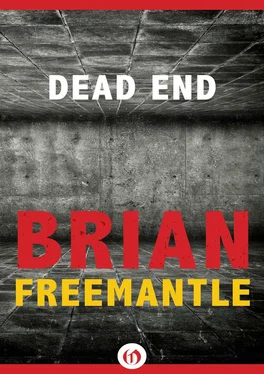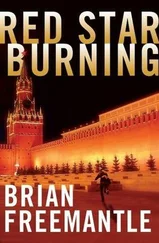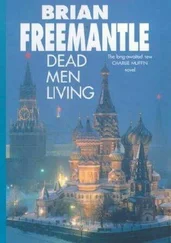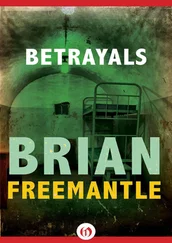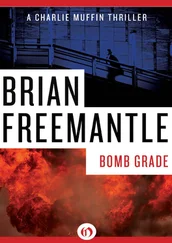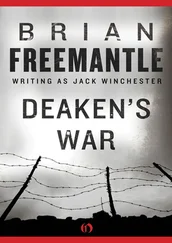Brian Freemantle - Dead End
Здесь есть возможность читать онлайн «Brian Freemantle - Dead End» весь текст электронной книги совершенно бесплатно (целиком полную версию без сокращений). В некоторых случаях можно слушать аудио, скачать через торрент в формате fb2 и присутствует краткое содержание. Жанр: Триллер, на английском языке. Описание произведения, (предисловие) а так же отзывы посетителей доступны на портале библиотеки ЛибКат.
- Название:Dead End
- Автор:
- Жанр:
- Год:неизвестен
- ISBN:нет данных
- Рейтинг книги:3 / 5. Голосов: 1
-
Избранное:Добавить в избранное
- Отзывы:
-
Ваша оценка:
- 60
- 1
- 2
- 3
- 4
- 5
Dead End: краткое содержание, описание и аннотация
Предлагаем к чтению аннотацию, описание, краткое содержание или предисловие (зависит от того, что написал сам автор книги «Dead End»). Если вы не нашли необходимую информацию о книге — напишите в комментариях, мы постараемся отыскать её.
Dead End — читать онлайн бесплатно полную книгу (весь текст) целиком
Ниже представлен текст книги, разбитый по страницам. Система сохранения места последней прочитанной страницы, позволяет с удобством читать онлайн бесплатно книгу «Dead End», без необходимости каждый раз заново искать на чём Вы остановились. Поставьте закладку, и сможете в любой момент перейти на страницу, на которой закончили чтение.
Интервал:
Закладка:
He was greeted at the enquiry section, quite separate from an open-plan, glassed-off office beyond, by a blonde, milk-fed girl who clearly recognized him without needing to read his ID tag. Hers identified her as Sally Kline. Adopting the American informality, he called her Sally. She called him professor. With ‘have a good day’ glibness she assured him retrieving his file wouldn’t be a problem, which it obviously wasn’t, because she returned from a side room with a manila folder in minutes. Directing him to one of the several reading tables, she asked if he wanted coffee. Parnell thanked her but refused.
The folder was thicker than he’d expected. And far more detailed. All his references had been taken up and there were copies of every scientific publication paper he could remember submitting. Surprisingly – the beginning of what became intense, even unsettling, curiosity – there were confirming copies of all his academic testimonials – school as well as college – duplicating every one he’d disclosed on his original application. A substantial reason for the file’s thickness were cuttings of what Parnell judged to be every newspaper account he could remember – and some he couldn’t – of his work on the international genome project, including all the interviews he’d given after his participation became public. There was also at least a quarter of an inch taken up by media accounts of Rebecca Lang’s murder, the inexplicable terrorism connection, his initial arrest and subsequent release. Several, he saw, were even from British newspapers, from which he was able to see how widespread the coverage had been in England and better appreciate his mother’s concern. Beyond the printed text were a selection of photographs of him at the time of his arrest, and afterwards, on the court steps. They were on top of an assortment of other prints, two of him gowned and mortar-boarded at graduation ceremonies, and three showing him in rowing strip at college events. Barbara Spacey’s first and second assessments, her third yet to come, were attached to his itemized personal records, the second so specific that it ran to two single spaced A4 pages.
Parnell’s surprise had grown into astonishment by the time he finished the dossier. It contained, he calculated, more information than he knew about himself – certainly things he had totally forgotten about himself. And more, much more, than he believed any employer, no matter how caring, to use Barbara Spacey’s justifying word, would or should need. His remark to Barbara Spacey about Nineteen Eighty-Four was very apposite. Parnell’s mind jumped. The FBI had traced Rebecca back to grade school, according to Howard Dingley. Had they had access to her Dubette file? The answer should be obvious, but so very little of what he knew about Rebecca’s murder investigation seemed obvious that it was definitely worth mentioning to the two agents.
He ached from the concentration with which he’d read all about himself, realizing for the first time that he’d been hunched over the table for forty minutes. Sally Kline responded at once to the summons bell. Through the glass behind her, Parnell saw several obviously alerted people looking at him in the smaller office.
‘Everything OK?’ she asked.
‘Fine.’
‘I filled out all that’s necessary for you,’ she said. ‘All you need to do is sign your access.’
‘I’m sorry?’ frowned Parnell.
‘The log,’ explained the girl. ‘Every file has an individual log, recording the date and the arrival and departure times of anyone reading it. I filled in everything for you. All you need to do is add your signature, to agree my figures.’
The document was upside down on the counter before him, but he could see there were three entries above his own name. ‘That’s who’s read it before me?’
‘Yes,’ confirmed the girl.
Parnell accepted the offered pen, tensed for the users’ log to be reversed towards him. He instantly registered the names Barbara Spacey, Harry Johnson and Dwight Newton. Each was timed and dated. The security chief was listed, ahead of the vice president, as having spent fifty minutes with the dossier, starting at ten past five in the evening, four days before Rebecca’s death. ‘I’m sorry,’ he said. ‘I’ve just remembered something. Could I just quickly check what I’ve forgotten? It won’t take a minute.’
‘If it’s only a minute,’ said Sally. ‘I’ve already written down your hand-back time.’
‘A minute,’ pledged Parnell. Which was all it needed to find his itemized personal records and confirm that the number of his Toyota was dutifully recorded.
Three days before the Sunday when Rebecca was killed would have been the Thursday he’d found his car damage – the car whose make and number Johnson had told the FBI he hadn’t known.
When he got back to his unit, there was a message from Henri Saby in Paris that the missing samples had been despatched, as arranged, with the waybill number. Parnell telephoned Harry Johnson first on the internal system, and immediately afterwards Barry Jackson on an external line. The lawyer said clients always had to pay for lunch.
‘I should have been told Parnell knew about the box-number facility,’ complained Harry Johnson.
‘I didn’t know myself until yesterday,’ said Newton, determined to get as much as he could from the abruptly demanded meeting with the security chief.
‘How much does he know?’
‘The president isn’t sure,’ said Newton, taking the first step to distance himself as much as possible from Edward C. Grant.
Johnson shook his head. ‘I don’t understand this. I’ve just had a call from Parnell asking me to collect some outstanding samples from Paris “that would be arriving the box-number route”. Those were his exact words, the box-number route. How does he know there is such a system? It’s supposed to be restricted!’
‘You’re going to have to ask him, I guess,’ said Newton.
Johnson looked at him suspiciously. ‘You’ve specifically spoken to the president about this?’
‘In New York, yesterday,’ confirmed Newton.
‘So, what did he say?’ insisted the security chief, impatiently.
‘You normally deal direct with Grant, don’t you?’ challenged Newton.
‘I wanted guidance this time, before I did.’
‘That might be a good idea in the future, you and I talking to each other,’ suggested Newton. Could he make an ally – an informant – of this man?
‘Why?’ asked Johnson, the tone openly suspicious now.
‘It was me he spoke to, about Parnell’s call to Paris. And he told me that it should be handled as it normally is. I don’t know why he didn’t bother to call you, as well.’
‘Saby didn’t call me, which was the arrangement I understood,’ agreed Johnson.
‘We’d both avoid being left out of decisions if we talked to each other. Things are too uncertain to be left out.’
‘Maybe you’re right,’ accepted Johnson. ‘So, I’m to collect it, as Parnell’s asked me to?’
‘Yes.’
‘Who do I give it to?’
‘Parnell.’
‘Not you? Or Russell Benn?’
‘Parnell,’ repeated the research director. ‘And you’re to reimpose the surveillance on Parnell.’
‘New York tell you that, too?’
‘Yes.’
Johnson stared challengingly at Newton. ‘Do Dubette think they can afford to cut me out of the loop?’
‘I don’t know what that means, Harry.’ He’d sown more doubt than he’d imagined possible, decided Newton.
‘I’ll talk to New York,’ said the security chief, intending it to sound like a threat.
‘I don’t know what your direct contact is all about,’ said Newton. ‘But I definitely think you should get on to New York. But it’ll still be an idea for us to talk about it, too. And for you to let me know what happens when you deliver the French stuff to Parnell.’ How much was he protectively going to learn from this man, wondered Newton.
Читать дальшеИнтервал:
Закладка:
Похожие книги на «Dead End»
Представляем Вашему вниманию похожие книги на «Dead End» списком для выбора. Мы отобрали схожую по названию и смыслу литературу в надежде предоставить читателям больше вариантов отыскать новые, интересные, ещё непрочитанные произведения.
Обсуждение, отзывы о книге «Dead End» и просто собственные мнения читателей. Оставьте ваши комментарии, напишите, что Вы думаете о произведении, его смысле или главных героях. Укажите что конкретно понравилось, а что нет, и почему Вы так считаете.
